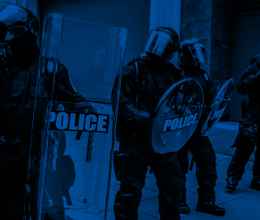On the morning of May 23, 2015, Cleveland Division of Police officer Michael Brelo was found not guilty on two counts of voluntary manslaughter for the deaths of Timothy Russell and Malissa Williams. Protests followed the announcement of the verdict, and by evening well over 100 demonstrators had gathered in downtown Cleveland. Police in riot gear funneled a group of the protesters into Johnson Court, a small alley between West 6th and West 9th streets, and trapped them inside – a tactic known as “kettling.” More than 70 individuals were arrested; most were detained for two nights and ultimately charged with failure to disperse. No audible order to disperse had been given, and even had such an order been given, there was no way for those trapped in Johnson Court to comply.
Those arrested were subsequently held in custody longer than necessary to prevent them from engaging in further demonstrations. Courts, prosecutors, and public defenders had been prepared to process arrestees promptly, but the police delayed processing the arrestees for arraignment.
Legal Theory
Defendants violated the protesters’ First Amendment right to protest and peacefully assemble and their Fourth Amendment rights to be free from unreasonable seizure and unlawful detention. Further, the defendants’ policy and practice of holding arrestees in custody longer than necessary punished the protesters for engaging in their constitutionally protected activities of peaceful protest and assembly and imposed a prior restraint on their speech. This policy effectively chilled the future protesters, including ACLU members, from going out and protesting in Cleveland for fear of arrest.
Status Update
On July 13, 2015 we filed a lawsuit in the U.S. District Court for the Northern District of Ohio on behalf of members of the ACLU of Ohio and four individuals arrested at the Brelo verdict protests. Our four individual plaintiffs are photographer Stephen McNulty and protesters Robin Goist, Jason Rodney, and Khalil Weathers. The City of Cleveland, Mayor Frank Jackson, and Chief of Police Calvin Williams are named as defendants. Judge Polster was assigned to our case.
In our lawsuit, we requested that the court award damages to our individual plaintiffs for their unlawful arrest and detention, the retaliation they suffered for engaging in constitutionally protected activities, and the prior restraint imposed on their speech. Further, we requested that the court issue an emergency preliminary order for Cleveland police to immediately stop unlawfully arresting and detaining protesters.
On August 25, 2015, Judge Polster entered an order agreed upon by the parties resolving the injunctive portion of the Complaint. As part of the order, the city adopted a new massarrest protocol that prevents the city from detaining protesters for unnecessarily prolonged periods and should ensure a more efficient procedure to process arrestees in the future.
On November 10, 2015, we agreed upon terms for settlement of the damages action. A settlement agreement was executed on March 1, 2016. We received the check and the case is closed.








